Crackpot, Problem Child, Great Fighting Leader Revisited

War Stories is taking the day off and will be back next week. For now, here’s a re-run of a post that ran August 29th.
One of these things is not like the others:
Crackpot. Problem Child. Great Fighting Leader.
Or is it?
What does a leader look like?
Eisenhower called Patton a “crackpot” and a “problem child” and a “great fighting leader in pursuit and exploitation.” (See letter below from General Eisenhower to General Marshall.)
“Old Blood and Guts” Patton was like many of history’s great warriors. He came with flaws—and those working with him had to decide if they could accept him, warts and all.
President Franklin D. Roosevelt’s response after being asked about Patton during a press conference:
I think probably that you may, if you want to write a piece, stick in there the story of a former president (Lincoln) who had a good deal of trouble in finding a successful commander for the armies of the United States.
And one of them turned up one day, and he was very successful.And some very good citizens went to the president and protested: “You can’t keep him. He drinks.”
“It must be a good brand of liquor,” was the answer.
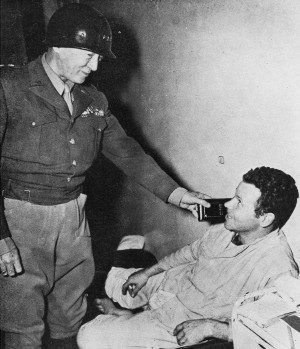
- LTG George S. Patton visiting wounded soldier in hospital.
He scared people during battle, just as much as he scared some during public appearances, with a microphone in front of him. No one knew what he was going to say or do.
He was admired.
General Eisenhower, after Patton’s death:
He was one of those men born to be a soldier, an ideal combat leader…It is no exaggeration to say that Patton’s name struck terror at the hearts of the enemy.
And he was disliked.
President Harry Truman:
[I] don’t see how a country can produce such men as Robert E. Lee, John J. Pershing, Eisenhower, and Bradley and at the same time produce Custers, Pattons, and MacArthurs.
He was a born warrior—and wanted to be in battle.
I love war and responsibility and excitement. Peace is going to be hell on me. I will probably be a great nuisance.
He was raw.
War is bloody, killing business. You’ve got to spill their blood, or they will spill yours! Rip them up the belly. Shoot them in the guts. When shells are hitting all around you and you wipe the dirt off your face and realize that instead of dirt it’s the blood and guts of what once was your best friend beside you, you’ll know what to do!
-
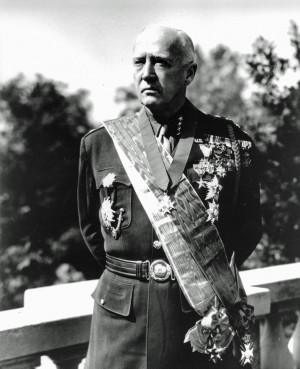
- George S. Patton with medals at Lake Vineyard, June 1945.
He was undiplomatic.
The more I see of people, the more I regret that I survived the war.
He was honest.
Every man is scared in his first battle. If he says he’s not, he’s a liar. Some men are cowards but they fight the same as the brave men or they get the hell slammed out of them watching men fight who are just as scared as they are. The real hero is the man who fights even though he is scared. Some men get over their fright in a minute under fire. For some, it takes an hour. For some, it takes days. But a real man will never let his fear of death overpower his honor, his sense of duty to his country, and his innate manhood. Battle is the most magnificent competition in which a human being can indulge. It brings out all that is best and it removes all that is base.
He was thoughtful.
Through a Glass, Darkly
by General George S. Patton, Jr.
Through the travail of the ages,
Midst the pomp and toil of war,
I have fought and strove and perished
Countless times upon this star.
In the form of many people
In all panoplies of time
Have I seen the luring vision
Of the Victory Maid, sublime.
I have battled for fresh mammoth,
I have warred for pastures new,
I have listed to the whispers
When the race trek instinct grew.
I have known the call to battle
In each changeless changing shape
From the high souled voice of conscience
To the beastly lust for rape.
I have sinned and I have suffered,
Played the hero and the knave;
Fought for belly, shame, or country,
And for each have found a grave.
I cannot name my battles
For the visions are not clear,
Yet, I see the twisted faces
And I feel the rending spear.
Perhaps I stabbed our Savior
In His sacred helpless side.
Yet, I’ve called His name in blessing
When after times I died.
In the dimness of the shadows
Where we hairy heathens warred,
I can taste in thought the lifeblood;
We used teeth before the sword.
While in later clearer vision
I can sense the coppery sweat,
Feel the pikes grow wet and slippery
When our Phalanx, Cyrus met.
Hear the rattle of the harness
Where the Persian darts bounced clear,
See their chariots wheel in panic
From the Hoplite’s leveled spear.
See the goal grow monthly longer,
Reaching for the walls of Tyre.
Hear the crash of tons of granite,
Smell the quenchless eastern fire.
Still more clearly as a Roman,
Can I see the Legion close,
As our third rank moved in forward
And the short sword found our foes.
Once again I feel the anguish
Of that blistering treeless plain
When the Parthian showered death bolts,
And our discipline was in vain.
I remember all the suffering
Of those arrows in my neck.
Yet, I stabbed a grinning savage
As I died upon my back.
Once again I smell the heat sparks
When my Flemish plate gave way
And the lance ripped through my entrails
As on Crecy’s field I lay.
In the windless, blinding stillness
Of the glittering tropic sea
I can see the bubbles rising
Where we set the captives free.
Midst the spume of half a tempest
I have heard the bulwarks go
When the crashing, point blank round shot
Sent destruction to our foe.
I have fought with gun and cutlass
On the red and slippery deck
With all Hell aflame within me
And a rope around my neck.
And still later as a General
Have I galloped with Murat
When we laughed at death and numbers
Trusting in the Emperor’s Star.
Till at last our star faded,
And we shouted to our doom
Where the sunken road of Ohein
Closed us in it’s quivering gloom.
So but now with Tanks a’clatter
Have I waddled on the foe
Belching death at twenty paces,
By the star shell’s ghastly glow.
So as through a glass, and darkly
The age long strife I see
Where I fought in many guises,
Many names, but always me.
And I see not in my blindness
What the objects were I wrought,
But as God rules o’er our bickerings
It was through His will I fought.
So forever in the future,
Shall I battle as of yore,
Dying to be born a fighter,
But to die again, once more.
He was a crackpot. He was a problem child. He was a great fighting leader.
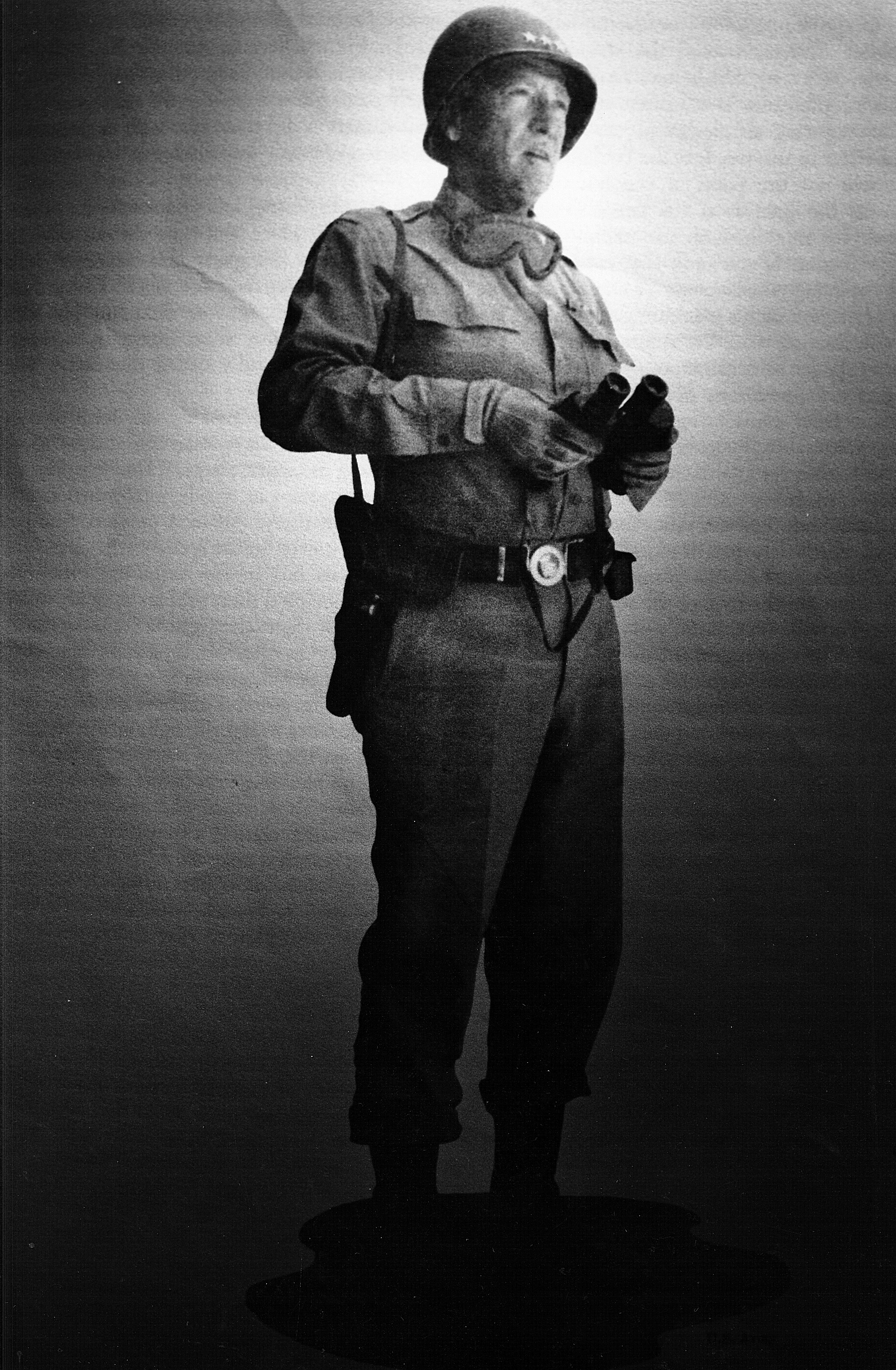
- LTG George S. Patton. Credit: General George S. Patton Jr. Collection.
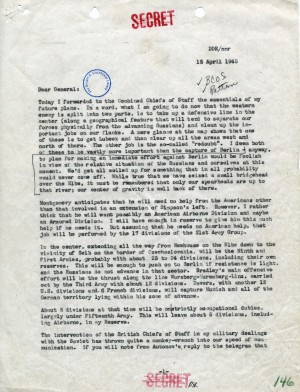
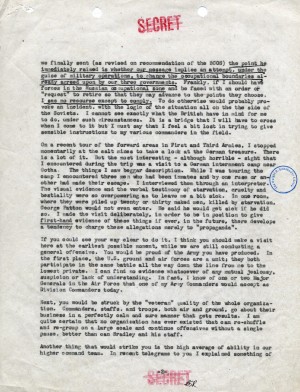
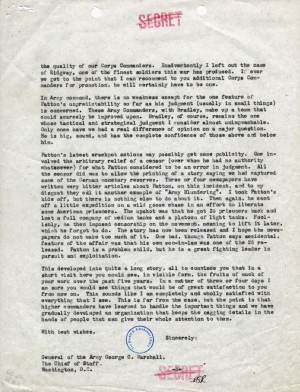





I thought for sure this would be about “Mad Jack” Churchill.
http://en.wikipedia.org/wiki/Jack_Churchill
He didn’t lead the glorious third army, he did go into battle in WW-2 armed with greatpipes, a longbow and claymore, and rather distinguished himself using these eccentric tools.
Everyone agrees Patton was a great war fighter and warrior. He did what he thought had to be done to win and most of the time he was right. He said what he thought what had to be said and well, who cares he won battles. In the context of a world war, he was an important piece of the puzzle. He was a squeaky wheel for sure, but that wheel kept turning and moving forward crushing the enemy (and still squeaking). The political leaders at home and in theater (i.e. Eisenhower) managed to use great ego maniacs like Patton and Montgomery to the advantage of the Allies to win, vanity and all.
General James Mattis.
Crackpot? Primitive? Self-centered twerp? Only good for combat? Self-absorbed ass? Who says so?
A man who can lead 300,000 men to victory in a desperate struggle while putting up with the carping, poor judgement and jealously of Eisenhower, Bradley, Marshal, Montgomery and Roosevelt is not well described by the above epithets. In fact, any man so described could not lead a squad.
The “great” Eisenhower (Roosevelt’s mouthpiece in London when he wasn’t on the golf course) never led troops at all. He opted out in WWI by teaching PT at Fort Benning. Nor did Bradley lead troops. During the great World War he accepted the duty of guarding copper mines in Montana. Marshal’s first, and only, experience in military leadership consisted of destroying the Illinois National Guard between WWI and WWII. Roosevelt believed that “Uncle Joe” Stalin was a friendly Communist and America’s ally. “Monty” caused a mutiny in his command by taking cigarettes away from combat soldiers in the middle of battle.
It was mostly the ability, valor, constancy and honor of Patton and MacArthur that were the deciding factors in the victories in Europe, Africa and the Pacific. And both men understood exactly what a communist was. But what would a little jumped-up haberdasher (Truman) know about that?
MacArthur prevented a Communist takeover of Japan after the war. Patton, two weeks before his death (murder?), told an FBI agent that he was going to resign his commission and tell the American people why they had just fought WWII: To make the world safe for the Communists.
In fact both men were highly evolved, rather elegant men with a deep understanding of history and a strongly entrenched love of their country.
Thank you, Callie. I enjoyed reading this.
I particularly liked your inclusion of “Through a Glass, Darkly”. It gave George’s character a dimensionality I’d never before encountered.